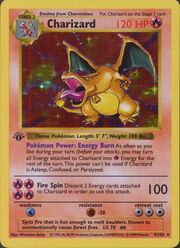The Pokémon Trading Card Game is a trading card game by The Pokémon Company.
With the release of Pokémon Ruby and Sapphire Game Boy video games and the EX Ruby and Sapphire expansion, Nintendo started publishing the cards itself. A recent incarnation of the card game is known as Pokémon-e Trading Card Game, most of the cards of which are compatible with the Nintendo e-Reader. However, sets including and after "EX Hidden Legends" do not include the "-e" in the title and do not have codes for the Nintendo e-Reader, no doubt due to its failure on the market, leading to it not being released in the UK.
Game concepts (Original/ Full Deck)

A holographic Pokémon Trading Card Game card. (Charizard) shown.
The game is centered on the concept of the Pokémon battle, similar to that of the video games. The objective of the game is to knock out six of the opponent's Pokémon. There are three types of cards: Pokémon cards, Trainer cards, and Energy cards. Later sets mix the card categories in an attempt to create more exciting gameplay, for example, where Pokémon cards can be used as Energy cards.
The different Pokémon characters have different attacks, defensive capabilities and Hit Points (HP). HP is the amount of damage it takes to knock that Pokémon out. Some Pokémon evolve into bigger and stronger Pokémon. Evolved Pokémon generally have more HP and stronger attacks than the lower stages.
Each Pokémon's attacks are listed on the card along with that attack's energy cost (the amount/type of Energy cards required) and base damage it does. Each player in turn can use one of his/her Pokémon's attacks (provided there is enough energy attached to power it) to do damage to the opponent's active Pokémon (generally referred to as the Defending Pokémon).
Most Pokémon cards are the actual Pokémon from the video game. Each player have up to six Pokémon in play at a time, one active and the rest on the bench. The rules can be easily extended to allow multiple battles, such as the two-on-two battling found in Pokémon Ruby and Sapphire.
A simplified type system was used for the trading card game. Instead of 17 types of Pokémon, only nine exist (with Darkness and Metal introduced with the Neo Genesis expansion):
| TCG type | Color | Video game type(s) |
|---|---|---|
| Colorless | Gray/White/Normal | Normal, Flying, Dragon |
| Darkness | Black | Dark |
| Fighting | Brown | Fighting, Rock, Ground |
| Fire | Red | Fire |
| Grass | Green | Grass, Bug, Poison |
| Lightning | Yellow | Electric |
| Metal | Silver | Steel |
| Psychic | Purple | Psychic, Ghost, |
| Water | Blue | Water, Ice |
Most Pokémon have only one type (a few, more recent have two). Weakness and resistance are determined by the type of the Pokémon (unlike the video game, where they are determined by the type of the attack used).
Pokémon that are weak to another type take twice the base damage in an attack. For example, most Fire type Pokémon are weak to Water. So, if a Water type Pokémon attacks a Fire type Pokémon with an attack that has a base damage of 20, that attack would do 40 damage to the Fire type Pokémon. (needs editing. rules have changed)
Some Pokémon have a Resistance to a particular type. Resistance decreases attack damage by 30. So if the opponent attacks with an attack that has a base damage of 40, but a Pokémon has a Resistance to the type of Pokémon the opponent is attacking with, the attack will only do 10 damage instead of 40. If the opponent's attack normally does 30 or less, then the attack will do no damage at all
Most Pokémon feature attacks that would reduce the HP of the opposing active Pokémon. These attacks require Energy, which come in the form of Energy cards. Many attacks require a certain type of energy, depending on the type of attack and the Pokémon using it. There were initially seven types of energy cards, including Fighting, Fire, Grass, Lightning, Psychic, Water, and Double Colorless energy.
Trainer cards are support cards that allow players to do something to enhance the game. Cards like Potion and Super Potion remove damage from a Pokémon to keep it from being knocked out as easily. Others allow for searching a deck for Pokémon, removing energy from the opposing Pokémon, and reviving Pokémon that has been knocked out. There are many other types of Trainer cards.
Beginning level players often do not realize the value of Trainer cards, but experienced tournament level players pay particular attention to the Trainer engine in their battle decks.
Of particular value are "draw" cards and "search" cards. In most cases, it is the player who gets his/her big attacker into play and powered up first who wins the game. In the normal course of play, players can only draw one card per turn from their deck. However, cards like Professor Oak's Research, Steven's Advice and Copycat let a player draw several new cards in a turn, while search cards like Dual Ball, Lanette's Net Search and Celio's Network let players search through their decks and get a particular card or cards. Championship caliber players know that in order to win games consistently, their decks must contain good draw power and search power.
Game Concepts (Half Deck/30-card deck)
The "Half Deck" is a new trend of playing Pokémon cards in Japan and Hong Kong that is not as well-known in the West.
Most of the rules are the same with Full deck, apart from the number of cards and some rules. The following is the list of differences between Full Deck and Half Deck:
- A Half Deck has 30 cards, compared to 60 cards in a Full Deck game.
- One only displays 3 prize cards in Half Deck, but 6 in Full Deck.
- Half Deck is more suitable for people that have little time or patience, or want a more exciting game.
Sets
Wizards of the Coast Sets
'Originals' Series 1
- Base Set (and Base Set 2, which was released after Team Rocket)
- Jungle
- Fossil
- Team Rocket
'Gym' Series
'Neo' Series
- Neo Genesis
- Neo Discovery
- Neo Revelation
- Neo Destiny
'Pokémon-e' Series 1
- Expedition
- Aquapolis
- Skyridge
Other Series
- Southern Islands (Promotional Set)
- Legendary Collection (Reprints of cards from the first four sets)
Nintendo Sets
'Pokémon-e' Series 2
- EX Ruby & Sapphire
- EX Sandstorm
- EX Dragon
- EX Team Aqua vs Team Magma
'Originals' Series 2
- EX Hidden Legends
- EX FireRed & LeafGreen
- EX Team Rocket Returns
- EX Deoxys
- EX Emerald
- EX Unseen Forces
- EX Legend Maker (Late release in English-language territories)
'Delta Species' Series
- EX Delta Species
- EX Holon Phantoms
- EX Crystal Guardians
- EX Dragon Frontiers
Video game releases
On December 18, 1998, Nintendo released a Game Boy Color game called Pokémon Trading Card. It was a game based on the original Pokémon games, but with trading cards instead of actual "monsters". This title was released in North America on March 31, 2000 and in Europe on December 8, 2000. It included the cards from the base set as well as its first two expansions, along with cards that are exclusive to the game.
A second Game Boy game, called Pokémon Card GB2, was released in Japan on March 28, 2001. It introduced a trading card parallel to Team Rocket, called Great Team Rocket, and also added cards from the Team Rocket expansion.
External links
- Pokémon Organized Play Website is the official US source of the Pokémon Organized Play program, where one can acquire information on local leagues and tournaments and find local distributors.
- Pokémon TCG Website is the official website for the Pokémon TCG.
Unofficial/Fan Pokémon TCG sites
- Hong Kong Pokémon Alliance. A Cantonese Pokémon site. Regular tournaments, regular researches, regular investigations and tuitions to all sorts of Pokémon Card players, including beginners.
- PokéBeach is a useful resource for anyone involved with the Pokémon TCG. Includes scans from the most recent sets and the latest news on the Pokémon TCG, as well as many other resources. Very nice website.
- PokéGym is a massive and extremely popular forum owned by Team Compendium for discussion of the Pokémon TCG featuring over 6,370 members. It includes featured articles on topics relating to the game as well as in-depth analysis of the game's most popular decks.
- Pojo.com was founded in December 1998, and updated daily since. Comprehensive Pokémon resource for the Trading Card Game and Video Games. Message Board has over 40,000 members. Also home of the popular Card of the Day.
- Pokepedia. Comprehensive, searchable Pokémon TCG database. Has a decklist builder, trader base, event mapper, and more.
